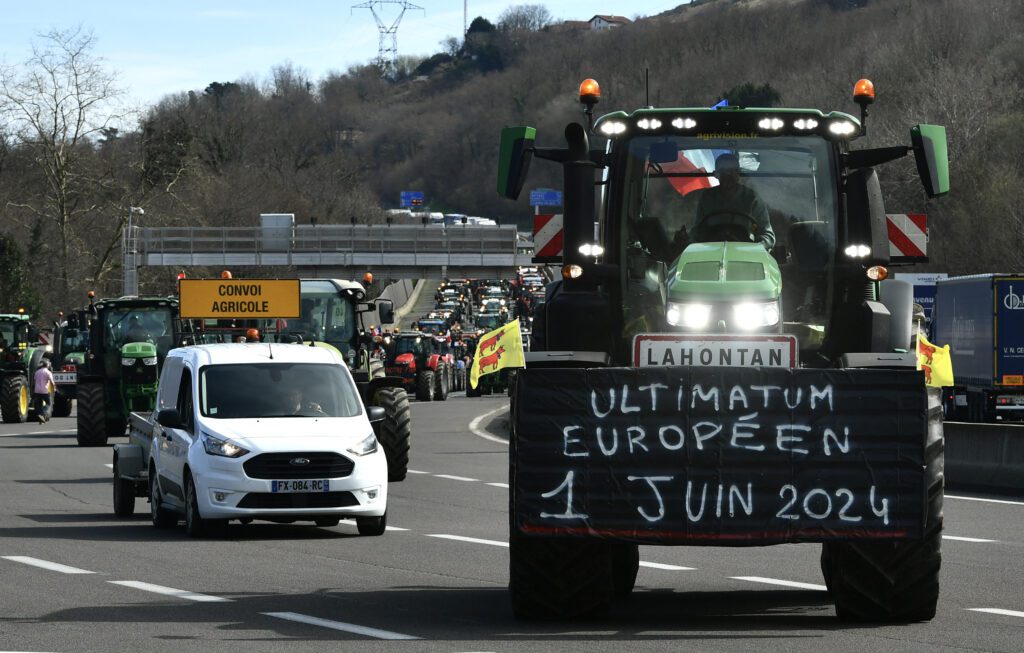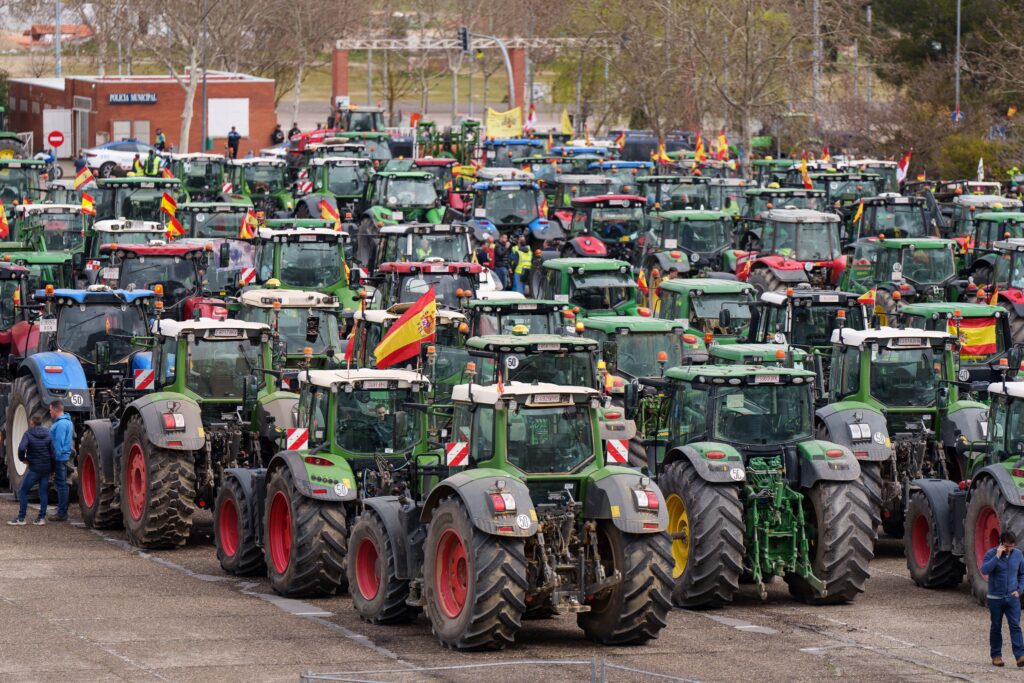
A sign reading “European ultimatum on 1 June 2024” as French farmers tractors block the French-Spanish border on March 7, 2024
Gaizka Iroz/AFP
Tractor convoys are fast becoming a defining image of two years of EU political failure, where green ideology has threatened the entire European agricultural economy and food security alike. Since February 2024, the stench of smoke and smoldering tires has surrounded the EU Commission’s Brussels headquarters as protesting farmers took the fight against Ukrainian imports, green regulations, and threats to the bloc’s agricultural subsidy system to the door of Eurocrats.
While the details of agricultural grievances vary between countries, the main threats to European farmers are rooted in EU climate policies, particularly the Green Deal. This ambitious—or unrealistic— policy idea menaces Europeans with climate change (an ‘existential threat’) and sets a goal of ‘net zero’ emissions of greenhouse gasses by the year 2050.
Farmers have been at the epicenter of the onslaught of Green Deal policies. The EU’s ‘Farm to Fork’ program, whose key word is ‘sustainability,’ aims for food security and affordability at the same time it is supposed to fight climate change and make EU farm products competitive on the world market—a tall, if not impossible, order. The program imposes limits on permitted fertilizers and pesticides as well as pushing ways to “halt biodiversity loss,” including ordering the fallowing or ‘re-wilding’ of previously productively worked farmland.
Farm-to-Fork goals of “protection of human and planetary health” have also led to indoctrination campaigns attempting to scare or shame Europeans into changing their traditional eating habits. Meat has been painted as a form of sustenance detrimental not just to our personal health, but to that of the planet, and thus humanity at large. The EU last year legalized the use of insects— mealworms and house crickets— in food production in an aggressive push to normalize insects as a more climate-friendly source of protein, an idea also championed by environmentalist groups and the influential World Economic Forum.
The fallout from the Ukraine war, and the EU’s willingness to support the war-torn country in any way possible, created even more problems for Europe’s farmers.

Ukraine-adjacent countries like Poland, Slovakia, and Hungary felt the impact of the EU’s 2022 decision to allow the duty-free imports of Ukrainian foodstuffs. After an agreement with Russia that allowed transport of Ukraine grain through the Black Sea failed to be renewed and was replaced by a blockade, the transition to road transport brought cheap grain to EU countries, undercutting the price European farmers could get for their nationally produced crops.
Bulgaria, Hungary, Poland, Romania, and Slovakia rebelled against the opening of their borders to Ukrainian agricultural products and the EU Commission finally allowed them to ban domestic sales of Ukrainian wheat, maize, and oilseeds for a time—though the products were allowed to transit through the countries.
Other imported food has also undermined European food production. In Spain, Moroccan imports have devastated the revenue of domestic farmers. Imports from countries unburdened by EU green policies—on everything from genetically modified crops to permitted fertilizers—have created an uneven playing field, further harming European farmers.
Dutch farmers were the first to sound the alarm as their national government, attempting to adhere to EU standards, began limiting not only the allowed use of nitrogen-rich fertilizer but also the size of herds of cattle and flocks of fowl. Not being allowed to raise their cattle or crops in a financially sustainable way, Dutch farmers began protesting the imposed edicts on a larger scale in 2022 and created enough of a movement that a new farmer-friendly party, the BBB, saw big wins in local and regional elections in 2023. It also did not help the climate-crazed Dutch government in the eyes of its farmers when the country decided to donate €100 million to a World Bank fund for Ukrainian farmers while imposing stricter emissions regulations on its own agriculture.
While raging inflation and massive protests have forced Eurocrats to backtrack some on their lofty climate goals, the looming question of how to square Ukraine’s budding EU membership with the Common Market and the Common Agricultural Policy are flashpoints into the 2024 elections and beyond. Reports claiming half of the EU’s agriculture subsidies would go to Ukraine after its accession have hardly improved the situation.
Ironically, in a stated effort to ensure Europeans have access to affordable, healthy food, Eurocrats have created a situation where farmers at home can no longer make a living producing locally grown food, while substandard or questionably produced imports—whose transportation hardly contributes to limiting the much- touted threat of climate disaster—are supposed to feed the continent.
Whatever happens, there will be plenty more occasions for Europe’s beleaguered farming class to hit the road and enlighten politicians as the economic realities of green ideology come crashing down on farmers, consumers, and—hopefully—the willfully ignorant ruling elite.
